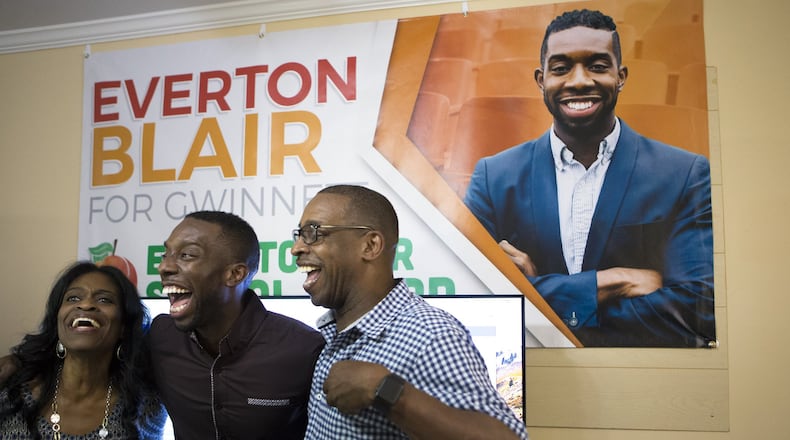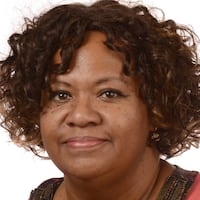When Everton Blair won the District 4 seat for the Gwinnett County Board of Education, he made history. As the first black man on the board as well as the youngest, voters looked to him to be a breath of fresh air among members who were old enough to be his grandparents. His base skewed young and minority.
“I want the community to have representation by someone who looks more like them and that they can relate to on different levels,” he said.
Now he’s adding another first to the list as he declares on National Coming Out Day that he identifies as gay.
“It’s not something that I’m hiding or that I’m ashamed of anymore,” he said. “I looked at it as a non-issue, but as I live my life publicly, I don’t want people to be timid about it or dance around it.”
Related story: Shiloh alum pays it forward a la Robert Smith
Related story: Gwinnett BOE has first person of color
He says he also wants LGBTQ students to have someone they can relate to and aspire to be like.
“I didn’t attend the most prestigious schools growing up but I worked hard to achieve what I’ve become. And I don’t have a special skill that others don’t possess. I want kids to know that.”
Blair graduated from Shiloh High School in 2009 and went on to graduate from Harvard University in 2013 with a bachelor’s degree in applied mathematics. He taught at the KIPP school in Atlanta, was an assistant program director with The Broad Academy and worked on a White House initiative for African Americans. He’s currently the director of program development for UnboundEd.org, an organization that provides free resources and training for teachers and education leaders.
Blair said he also wants LGBTQ students to know that he’s gone through what some of them are experiencing now — the bullying, the hiding, the feeling of being less than others, grappling with identity.
“Everybody can reach out to me, but I want those kids to know that I’m not just an advocate, I’m a member of the group.”
Blair is among a growing demographic in politics. Although he’s now one of three openly gay Gwinnett County representatives — Rep. Sam Park, D-Lawrenceville and Ben Ku, Gwinnett County Commissioner for District 2 — metro Atlanta has had several elected officials and many more candidates from the LGBTQ community.
Cathy Woolard first ran for Atlanta City Council in 1997 and eventually became council president. She ran for mayor of Atlanta in 2017. She was the first openly gay elected official in Georgia history. Most recently Antonio Brown won a seat on Atlanta City Council that was left vacant after the death of Councilman Ivory Lee Young Jr., 56, from cancer in November.
Rep. Karla Drenner, D-Avondale Estates, was the first openly gay member of the Georgia General Assembly, and Joseph Geierman is an openly gay former Doraville City Councilman running for Doraville mayor.
Even though society appears to be more open to “non-traditional” candidates, coming out isn’t necessarily a political advantage, said Scott Ainsworth, head of the political science department at the University of Georgia.
“Obviously attitudes have changed in the last several decades, but it probably doesn’t add support,” he said. “At best it’s neutral.”
But Annise Parker, president and CEO of LGBTQ Victory Fund, a nonpartisan political action committee dedicated to increasing the number of openly LGBTQ public officials in the United States, believes being open about one’s sexuality can garner points for honesty.
“You’ll probably see more people who say they don’t agree with the candidates ‘lifestyle,’ but if they were honest about that, they’re more apt to be honest about other things.”
As the former mayor of Houston, Parker was the first openly LGBTQ person elected mayor of a major American city. But every election is important, she said, adding that 2018 was a “watershed moment” for the LGBTQ community with more than 700 “out” candidates.
An estimated 4.5% of U.S. adults identify as lesbian, gay, bisexual or transgender, and they tend to be younger and poorer than the population at large, according to an analysis of polling data released in March by the Williams Institute at the UCLA School of Law.
The Williams Institute, which specializes in LGBT research for law and public policy, also concluded that most U.S. adults estimate that nearly one in four Americans (23.6%) are gay or lesbian. Gallup has previously found that Americans have greatly overestimated the U.S. gay population, recording similar average estimates of 24.6% in 2011 and 23.2% in 2015.
No matter the perception or the reality, Blair said at the end of the day he’s just a man trying to serve his community.
“I’ve been in situations where I’m too black in the gay community or too gay in the black community, but I’m both and I’m a person who cares about education and policy and that’s what I want my constituents to remember most.”
About the Author
The Latest
Featured



